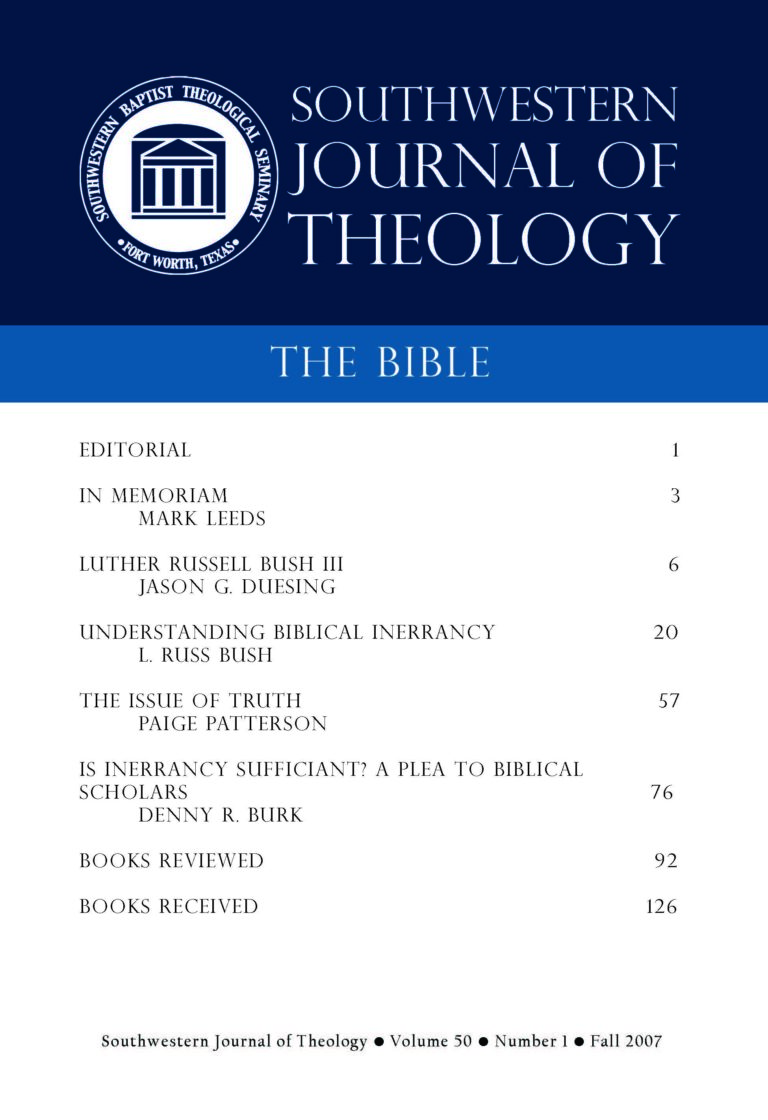
The Bible
Southwestern Journal of Theology
Volume 50, No. 1 – Fall 2007
Managing Editor: Malcolm B. Yarnell III
In the fall of 1997 a ragtag group of two dozen seminary students gathered in an upper room of Hickory Grove Baptist Church in Charlotte, North Carolina. We had everything from pastoral veterans in their fifties to theological neophytes in their early twenties. I was one of the latter. We were all students enrolled in Southeastern Baptist Theological Seminary’s extension program and awaiting the arrival of our professor for “Introduction to Christian Philosophy.”
Like most first semester students I had great hopes that I would be profoundly impacted by my seminary professors, but I had no idea just how strongly I would be affected by the teaching ministry of this particular professor. I do not remember the details of Dr. Bush’s arrival that day, but I can remember being immediately exposed to new ways of thinking. Under his guidance we spent the rest of that semester dwelling in Platonic caves, being relocated by the Aristotelian Unmoved Mover, sleeping on Procrustean beds, taste testing Cartesian half-baked bread, calling for Humean eight balls to find their way to the corner pocket, wondering how Lessing lost his moorings, enduring Darwinian cold shudders, and taking bread (and carrots) to feed the Wittgensteinian duck-rabbits. I found myself in a new world where I knew not just what I believed, but why I believed it. The best part of it all was that I found myself more effective in my witness to those around me.
It was only after arriving on the main campus a year later that I realized that Dr. Bush was the dean of the seminary. I was amazed that even though he had great responsibility and large classes at the main campus, he was pleased to serve little groups like the one in Charlotte. Although I had no other classes with Dr. Bush at the master’s level, I continued to be affected by his ministry. The faculty he led and the curriculum he oversaw challenged me to grow intellectually and spiritually throughout the rest of my Master of Divinity. I was also deeply impacted by the work he crafted with Tom Nettles, Baptists and the Bible. I was impressed by the way this
work so clearly documented the thinking of our Baptist forefathers on the Bible.
Baptists and the Bible also very unexpectedly planted a seed that would come to fruition in my doctoral work on the imagination. It is amazing how just a few paragraphs can spark an interest that lasts a lifetime. For me this paradigm shift occurred as I read and re-read the two paragraphs in chapter eight on Shelley’s Frankenstein. It had never occurred to me before this point that Frankenstein in particular and all great art in general were communicating philosophical and theological worldviews. Before, they seemed to be mere frivolities, but now they became powerful means of Christian expression. Dr. Bush continued to influence my thinking on the arts and imagination as I moved into doctoral work.
My decision to pursue a Doctor of Philosophy was due in large part to my desire to learn everything I could from Dr. Bush. Over the next three years I took every seminar I could with him. The topics included philosophy, apologetics, science, and culture. In these classes we discussed issues like the pillars of western thought, Intelligent Design, the artwork of the great masters, and the power of modern cinema. Dr. Bush encouraged us to present research papers in our area of interest. I was able to explore and critique quantum physics and the incarnation, imagination and philosophy, and the fantasy realms of Middle-Earth and Narnia.
I continued to feel the influence of Dr. Bush even after my seminars were completed as he agreed to serve on the committees for my comprehensive examination and doctoral dissertation defense. I knew that no matter how much I prepared for these events I would have to stay on my intellectual toes with Dr. Bush in the room, yet I wanted him to be there. He would inevitably have in store several questions that could not be anticipated. Still I knew he would ask them in love with an eye toward molding me right to the very end. I can remember being asked about everything from the viability of Superman as a hero for Christian children to the use of magic in the Harry Potter books. I will never forget his words to me at the end of my dissertation defense. He said, “I really think you have accomplished what you set out to do when you started working on the imagination five years ago.” To hear this from a beloved professor is encouraging beyond words.
My seminary story is just one small piece of the legacy left behind by Dr. Bush. All hyperbole aside, his teaching truly lives on in the ministries of his students. I can tell you with certainty it lives on here at Southwestern Baptist Theological Seminary in my own teaching ministry. Whether I am explaining the impact of philosophy on theology in “Systematic Theology” or presenting a biblical basis for the arts in “Fine Arts Perspectives on Life,” I can hear the echoes of his voice in mine as I see what he saw for so many years of seminary ministry, hope for the future as God raises up the next generation of leaders.
It is to the memory of Dr. L. Russ Bush that we dedicate this volume of the Southwestern Journal of Theology.





